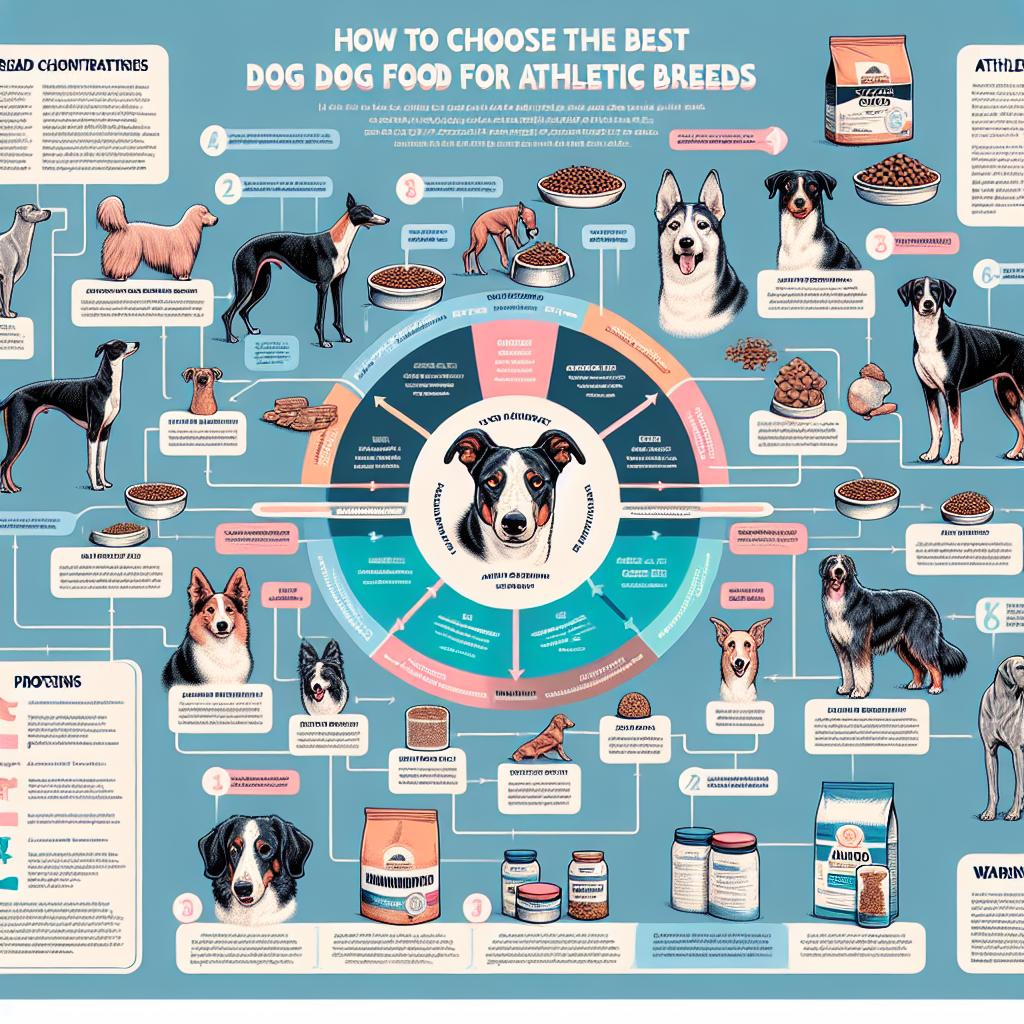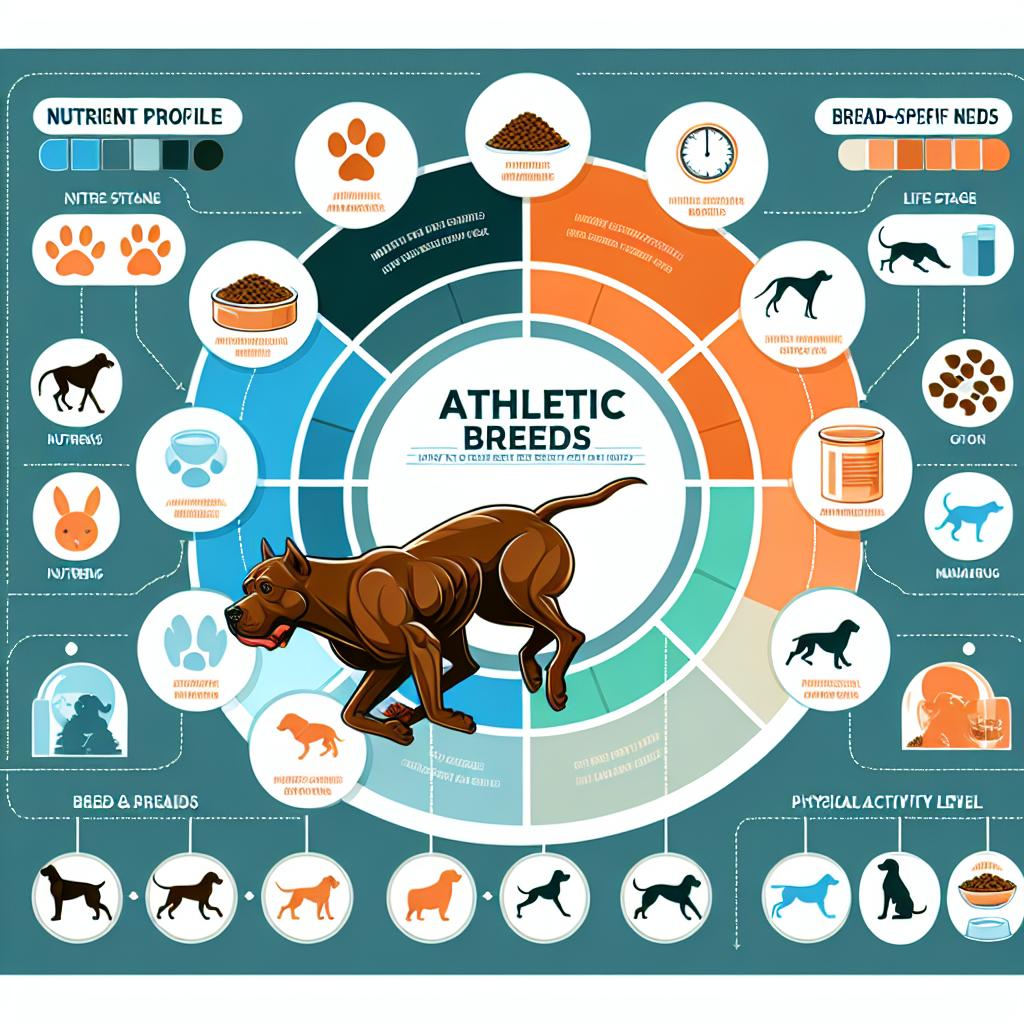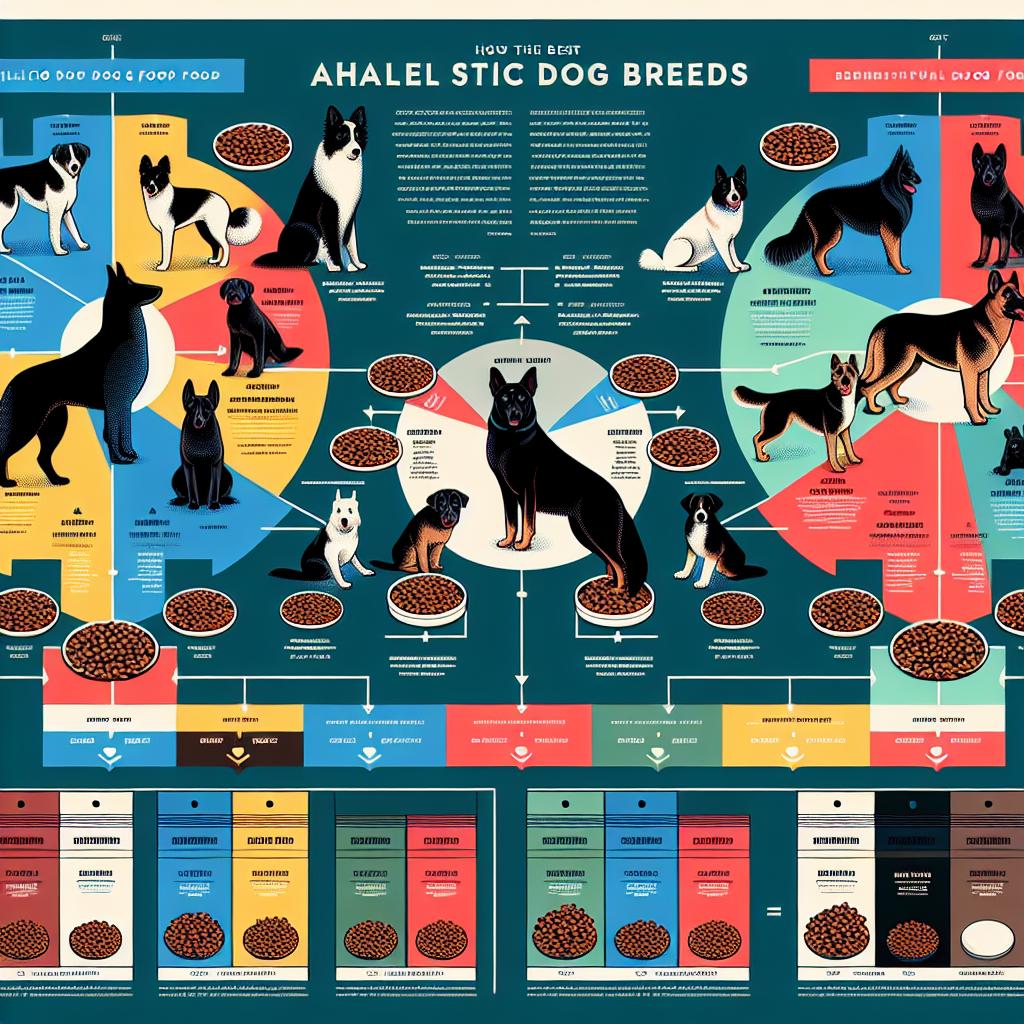When it comes to keeping our four-legged companions healthy and vibrant, one of the most critical decisions a pet owner can make is selecting the right dog food, especially for athletic breeds known for their boundless energy and strength. Unlike their more sedentary counterparts, these active pups require a diet tailored to their unique nutritional needs, ensuring they receive the fuel necessary to power their adventures. In a market flooded with options, ingredients, and marketing claims, finding the ideal dog food can feel overwhelming. This article aims to guide you through the process, highlighting essential factors to consider and helping you make informed choices for your athletic canine partner. By understanding their specific requirements, you can provide them with the nourishment they need to thrive—both on and off the field.
Understanding Nutritional Needs of Athletic Dog Breeds
The nutritional needs of athletic dog breeds differ significantly from those of more sedentary pets. These energetic dogs typically require higher levels of protein and fat to support their active lifestyles and maintain muscle mass. A balanced diet should include high-quality animal proteins, which provide essential amino acids for muscle repair and growth. In addition to proteins, their food should also contain healthy fats to provide the energy needed for intense physical activity and to promote a shiny, healthy coat.
It’s important to remember that hydration plays a critical role in an athletic dog’s performance and recovery. Always ensure fresh water is available, particularly after vigorous activities. When selecting dog food, consider the following key nutrients:
- Omega-3 and Omega-6 fatty acids for joint health and inflammation reduction.
- Vitamins and minerals, particularly calcium and phosphorus, for strong bones.
- Digestive enzymes or probiotics to support gut health and nutrient absorption.
| Key Nutrients | Benefits |
|---|---|
| Proteins | Muscle repair and energy |
| Healthy Fats | Energy and coat health |
| Vitamins | Bone strength and immune support |

Evaluating Ingredients for Optimal Energy and Performance
When selecting the right dog food for athletic breeds, it’s crucial to assess ingredients that promote energy and enhance overall performance. Look for foods high in quality protein sources to support muscle development and recovery. Consider ingredients like:
- Chicken, turkey, or beef - Rich in essential amino acids
- Fish – Provides omega-3 fatty acids for joint health
- Eggs – A complete protein source with easy digestibility
Additionally, carbohydrates are vital for supplying the quick energy athletes need. Choose formulas containing:
- Brown rice or sweet potatoes – Provide sustained energy release
- Oats – High in fiber and beneficial for digestion
- Barley – Offers a low glycemic index, ensuring steady energy
Don’t overlook the importance of fats, which are crucial for caloric density and stamina. Look for added omega-3 and omega-6 fatty acids from sources like fish oil or flaxseed. A well-rounded nutritional profile is key to keeping athletic dogs performing at their best.

Special Considerations for Age and Size of Active Dogs
When selecting the optimal nutrition for active dogs, it is essential to consider both their age and size, as these factors dramatically influence their dietary needs. For puppies and
Size plays a significant role in the formulation of dog food as well, particularly concerning the digestibility and nutrient density. Generally, larger breeds will require more calories to sustain their activity levels, but it’s crucial to choose a food that is designed for their size to avoid potential health issues. For instance, opting for a specially formulated large breed athletic diet ensures that they get the right nutrients without overloading them on calories. Smaller breeds, on the other hand, might need food that is easier to chew and has a higher fat content for energy. tailoring a dog’s diet based on their specific life stage and size ensures they receive the adequate support needed for their active lifestyle.

Top Recommended Brands for High-Performance Dog Food
When it comes to feeding your active canine companion, choosing the right brand can make all the difference in maintaining their energy levels and overall health. Here are some top recommended brands known for their high-performance dog food formulations:
- Orijen – Renowned for its biologically appropriate recipes, Orijen uses fresh, regional ingredients to provide optimal nutrition for active breeds.
- Blue Buffalo – Offering multiple formulas tailored for athletic dogs, Blue Buffalo prioritizes meat protein and whole grains to ensure sustained energy.
- Canidae – With its grain-free options and a variety of protein sources, Canidae delivers balanced nutrition ideal for sporting and working dogs.
- Taste of the Wild – This brand features high-quality proteins and antioxidants, perfect for maintaining the vigor of high-energy breeds.
For a more detailed comparison, consider this table showcasing some nutritional highlights and features of these brands:
| Brand | Main Protein Source | Grain-Free Option | Special Features |
|---|---|---|---|
| Orijen | Chicken & Turkey | Yes | High protein, Whole prey ratios |
| Blue Buffalo | Deboned Chicken | Yes | LifeSource Bits, Antioxidants |
| Canidae | Multiple Sources | Yes | Easy digestion, High meat content |
| Taste of the Wild | Roasted Bison | No | High in Omega fatty acids |
Q&A
Q&A: How to Choose the Best Dog Food for Athletic Breeds
Q1: What defines an athletic breed?
A: Athletic breeds are typically characterized by their high energy levels, strong muscles, and overall vitality. These dogs, such as Border Collies, Labrador Retrievers, and Belgian Malinois, thrive on physical activity and require diets that support their active lifestyles.
Q2: Why is it important to select the right food for athletic dogs?
A: Choosing the right food is crucial because athletic breeds have unique nutritional needs that differ from more sedentary dogs. They require higher protein levels for muscle development, sufficient carbohydrates for energy, and other essential nutrients to maintain their health and stamina during rigorous activities.
Q3: What ingredients should I look for in dog food for athletic breeds?
A: Look for high-quality protein sources like chicken, beef, or fish as the primary ingredient. Ideally, the food should also contain whole grains (like brown rice or oats) for energy, healthy fats (such as omega fatty acids) for joint support, and a balance of vitamins and minerals to enhance overall health.
Q4: Are there specific brands recommended for athletic breeds?
A: While several brands cater to athletic breeds, it’s important to look for those that emphasize high protein content, quality carbohydrates, and added nutrients. Brands like Orijen, Blue Buffalo Wilderness, and Taste of the Wild often come recommended. Always check for AAFCO (Association of American Feed Control Officials) statements to ensure the food meets nutritional standards.
Q5: How do I determine the right caloric intake for my athletic dog?
A: Caloric needs depend on factors like age, weight, metabolic rate, and activity level. A general guideline is to consult your veterinarian or use feeding guides provided by dog food manufacturers, adjusting portions based on your dog’s energy expenditure. Regularly monitor your dog’s weight and energy levels to make any necessary adjustments.
Q6: Should I consider feeding my athletic dog grain-free food?
A: Grain-free diets can be beneficial for some dogs, especially those with specific allergies or sensitivities. However, they’re not inherently superior for all athletic breeds. Always opt for a diet that suits your dog’s specific health needs; consult your veterinarian if you’re uncertain about grain inclusion.
Q7: Is it necessary to supplement my dog’s diet with vitamins or additional nutrients?
A: Generally, if you’re feeding a high-quality commercial diet that meets AAFCO standards, additional supplementation is not necessary. However, if your dog has special health concerns or dietary restrictions, discussing vitamin supplementation with your veterinarian can help tailor their nutrition more effectively.
Q8: How often should I feed my athletic dog?
A: Most athletic dogs do well with two meals a day, spaced out to optimize energy levels throughout the day. For particularly active dogs, you might consider feeding multiple smaller meals or adding snacks after workouts to help with recovery.
Q9: What should I avoid when selecting food for my athletic dog?
A: Avoid dog foods that are high in fillers (like corn and by-products), artificial additives, and low-quality ingredients. Foods that lack sufficient protein or balanced nutrition could compromise your dog’s performance and health.
Q10: What are some signs that I’ve chosen the right food for my athletic breed?
A: Keeping an eye on your dog’s energy levels, coat condition, muscle tone, and overall health can indicate whether you’ve selected the right food. If your dog is energetic, maintains a healthy weight, and has a shiny coat, you’re likely on the right track!
selecting the best dog food for athletic breeds involves understanding their specific needs and diligently evaluating food options. With informed decisions, you can ensure your furry athlete stays fit, healthy, and at the top of their game!
Future Outlook
In the vibrant world of pet care, selecting the ideal dog food for your athletic breed is not just a task; it’s an art form that requires consideration, knowledge, and a touch of intuition. As you’ve journeyed through this guide, you’re now equipped with the tools to make informed decisions that will fuel your furry companion’s energy, enhance their performance, and promote their overall well-being. Remember, the best dog food is one that aligns with your dog’s unique needs, lifestyle, and flavor preferences, striking a harmonious balance between nutrition and enjoyment.
As you stand at the crossroads of choice, take a moment to reflect on your athlete’s specific requirements. Don’t hesitate to consult your veterinarian for tailored advice, ensuring that your beloved pet thrives on a diet crafted for champions. After all, nutrition is the foundation of health, and for those remarkable canine athletes, it’s the fuel that propels them to greatness.
choosing the right dog food isn’t just about ingredients on a label; it’s about forging a deeper bond with your pet, celebrating their spirit, and supporting their journey in every stride and leap. With the right sustenance, your athletic breed will not only meet but exceed their potential, turning every run into a joyful adventure and every moment together into a cherished memory. Happy feeding, and here’s to many exciting adventures ahead!

